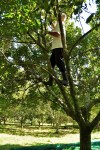Geographically speaking, New Zealand is by no means a large country; it’s roughly the same size as Italy. But in a land where the sheep and cows grossly outnumber the humans, you can expect a fair amount of distance between towns. Luckily, there are numerous options to get a traveler from A to B.
Bus. The list of companies is long, and many cater to tourists by making stops along the way so you can take photos.
Air. JetStar and Air New Zealand have relatively affordable flights between the major cities and tourist destinations.
Thumbing it. Hitchhiking is technically illegal, but New Zealand must be one of the safest and most friendly places to hop in a stranger’s car. My guess is that with the long distances people are used to driving, the company is appreciated.
However, our issue with all options was that they depart from and arrive in a town. While these Kiwi towns are always ridiculously convenient and clean, they were not the reason we came to New Zealand. The magical fjords, stunning mountain peaks, mesmerizing alpine lakes, eerie caves and remote beaches simply cannot be found in town.
Organized tours will take you via bus to the highlights, but I’m not exactly the tour group type and we didn’t come to just see the highlights. We wanted to wander around this country without any itinerary or specific route in mind. We wanted the flexibility to stay in one place longer than expected or change our destination last-minute due to bad weather and we wanted the ability to travel faaaaaaarrrr off the beaten path.
From the start it was clear that the only way to truly see New Zealand is by car, and with nearly a year to travel, renting didn’t make any sense. On Day #3, still jet-lagged and going through severe caffeine withdrawal, we started to shop for used vehicles.
Lucky for us, we were not the only young travelling couple to arrive at this conclusion. There are so many backpackers who come to New Zealand on the Working Holiday Visa that there’s actually a backpacker car market. Stop in any hostel in Auckland or Christchurch and you’ll see a massive number of ads posted by backpackers who’ve finished their journey and need to sell their campervan before returning home.
What on earth is a campervan? Is that a Kiwi word for caravan, camper or motorhome?
No. A campervan has its own category. Where campers and motorhomes have toilets, showers and/or kitchens, a campervan has none of the above. Where a Caravan must be towed behind a vehicle, a campervan runs on its own.
In this country, and in Australia I’m told, old minivans which once transported kids to rugby practice are given a second life – the back seats are taken out and an elevated bed frame & mattress are fitted in their place. Add a few curtains, some storage boxes under the bed, and voila! You have a Campervan.
So wait, you sleep in a minivan? Why on earth would you want live like that?
The average cost of a hostel DORMITORY bed is between $25-$35 per person, per night (~$20-$28 USD). I haven’t quite figured out why the price is so high, but prices in NZ are generally ridiculously high compared to the States and the majority of Europe. So a little bit of math: 2 people x 10 months x $30/night lodging = WAY more money than the cost of a campervan.
Where do you park the van overnight (a.k.a. sleep)?
The general consensus is that “Freedom Camping” is permitted except in areas where there are signs explicitly prohibiting it (ex. “NO Camping” or “NO Overnight Parking”). As long as you’re near a 24-hour toilet, which conveniently enough are EVERYWHERE in this country, you’re free to park as long as you like.
After shopping around for about a week, Eugenio and I decided on a 1995 Nissan Serena for $2,700. It was by far the best decision we made – thanks to our campervan, we slept in some of the country’s best places, woke up to spectacular views, and successfully avoided the Tourist Route. Here are some of the van’s model shots:






















 Taumatawhakatangihangakoauauotamateaturipukakapikimaungahoronukupokaiwhenuakitanatahu
Taumatawhakatangihangakoauauotamateaturipukakapikimaungahoronukupokaiwhenuakitanatahu













